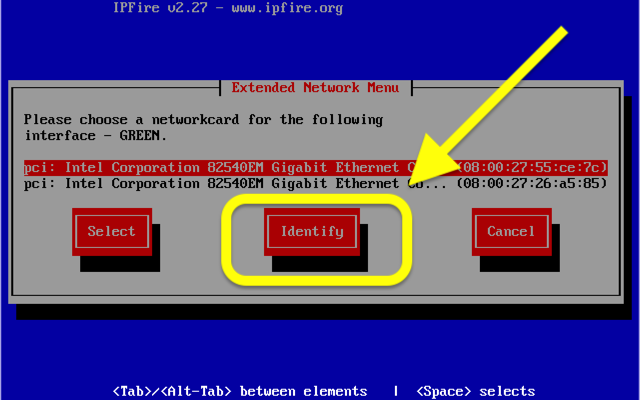Hi,
I am trying to set up ipfire on a clearfog base SoB following the instructions at wiki.ipfire.org - ClearFog Base / Pro.
I am using the downloadable sdhc, base uboot image from MEGA
together with the arm legacy, v 2.27 ipfire image from the download page.
Uboot reports all three interfaces present on the board (the SFP interface is empty, and neither of the RJ45 connectors is in use for the initial setup), and assigns them eth1 - eth3 values:
U-Boot 2018.01-02337-gdc4398fdb8-dirty (Nov 21 2018 - 15:25:52 +0100)
SoC: MV88F6828-A0 at 1600 MHz
DRAM: 1 GiB (800 MHz, 32-bit, ECC not enabled)
MMC: mv_sdh: 0
Model: SolidRun Clearfog
Board: SolidRun ClearFog Base
SCSI: AHCI 0001.0000 32 slots 2 ports 6 Gbps 0x3 impl SATA mode
Net: eth1: ethernet@70000, eth2: ethernet@30000, eth3: ethernet@34000
Hit any key to stop autoboot: 0
but ipfire is only seeing a single interface. /var/log messages
cat /var/log/messages | grep ethernet
Mar 9 23:54:06 (none) kernel: mvneta f1070000.ethernet eth0: PHY [f1072004.mdio -mii:00] driver [Marvell 88E1510] (irq=POLL)
Mar 9 23:54:06 (none) kernel: mvneta f1070000.ethernet eth0: configuring for ph y/rgmii-id link mode
Mar 9 23:59:34 (none) kernel: mvneta f1070000.ethernet green0: renamed from eth 0
Mar 10 00:01:30 ipfire kernel: mvneta f1070000.ethernet green0: PHY [f1072004.md io-mii:00] driver [Marvell 88E1510] (irq=POLL)
Mar 10 00:01:30 ipfire kernel: mvneta f1070000.ethernet green0: configuring for phy/rgmii-id link mode
Mar 10 00:04:43 ipfire kernel: mvneta f1070000.ethernet green0: PHY [f1072004.md io-mii:00] driver [Marvell 88E1510] (irq=POLL)
Mar 10 00:04:43 ipfire kernel: mvneta f1070000.ethernet green0: configuring for phy/rgmii-id link mode
Mar 10 00:12:03 ipfire kernel: mvneta f1070000.ethernet green0: PHY [f1072004.md io-mii:00] driver [Marvell 88E1510] (irq=POLL)
Mar 10 00:12:03 ipfire kernel: mvneta f1070000.ethernet green0: configuring for phy/rgmii-id link mode
UPDATE: I just replaced uboot with the version from images.solid-run DOT com/A38X/U-Boot
No change in behaviour.
U-Boot SPL 2018.01-02337-gdc4398fdb8 (May 14 2018 - 18:25:17)
High speed PHY - Version: 2.0
Detected Device ID 6828
board SerDes lanes topology details:
| Lane # | Speed | Type |
| 0 | 3 | SATA0 |
| 1 | 0 | SGMII1 |
| 2 | 5 | PCIe1 |
| 3 | 5 | USB3 HOST1 |
| 4 | 5 | USB3 HOST0 |
| 5 | 0 | SGMII2 |
:** Link is Gen1, check the EP capability
PCIe, Idx 1: Link upgraded to Gen2 based on client capabilities
High speed PHY - Ended Successfully
DDR3 Training Sequence - Ver TIP-1.29.0
DDR3 Training Sequence - Switching XBAR Window to FastPath Window
DDR3 Training Sequence - Ended Successfully
Trying to boot from MMC1
U-Boot 2018.01-02337-gdc4398fdb8 (May 14 2018 - 18:25:17 +0200), Build: jenkins-u-boot-clearfog-model=base,variant=sdhc-10
SoC: MV88F6828-A0 at 1600 MHz
DRAM: 1 GiB (800 MHz, 32-bit, ECC not enabled)
MMC: mv_sdh: 0
Model: SolidRun Clearfog
Board: SolidRun ClearFog Base
SCSI: AHCI 0001.0000 32 slots 2 ports 6 Gbps 0x3 impl SATA mode
Net: eth1: ethernet@70000, eth2: ethernet@30000, eth3: ethernet@34000
Hit any key to stop autoboot: 0
